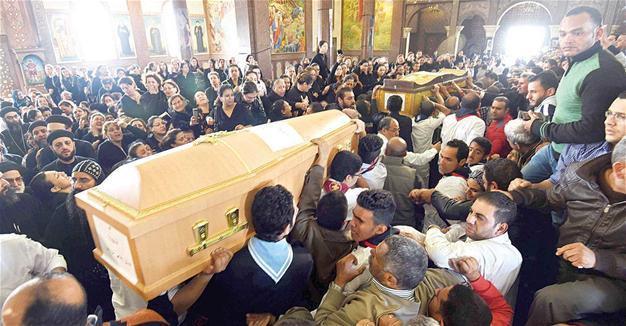State of emergency in Egypt after ISIL church bombings kill 44
CAIRO
 Egyptian President Abdel Fattah al-Sisi announced a three-month state of emergency following twin church bombings by the Islamic State of Iraq and the Levant (ISIL) that killed at least 44 people on Palm Sunday, April 9, the deadliest attacks on the minority in recent memory.
Egyptian President Abdel Fattah al-Sisi announced a three-month state of emergency following twin church bombings by the Islamic State of Iraq and the Levant (ISIL) that killed at least 44 people on Palm Sunday, April 9, the deadliest attacks on the minority in recent memory.The attacks in the Nile Delta cities of Tanta and Alexandria followed a Cairo church bombing in December last year and came weeks before a planned visit by Catholic Pope Francis intended to show support for Egypt’s Christian minority.
Sisi declared the “three-month” state of emergency, which he must present to parliament within a week, during a defiant speech warning that the war against the jihadists “will be long and painful.”
On April 10, the Egyptian cabinet said a three-month state of emergency would go into force from 1 p.m. (11:00 a.m. GMT).
The nationwide measure must be approved by parliament within seven days to remain in place.
“The armed forces and police forces will do what is necessary to confront the threats of terrorism and its financing in order to maintain security across the country, protect public and private property and the lives of citizens,” a cabinet statement said.
The first bombing at the Mar Girgis church in Tanta city north of Cairo killed 27 people, the health ministry said.
Emergency services had scrambled to the scene when another blast rocked St Mark’s church in Alexandria where Coptic Pope Tawadros II had been leading a Palm Sunday service.
Seventeen people including at least four police officers were killed in that attack, which the interior ministry said was caused by a suicide bomber who blew himself up when prevented from entering the church.
The ministry said Tawadros was unharmed, and a church official said he left before the explosion.
The private CBC Extra channel aired footage of the Alexandria blast, with CCTV showing what appeared to be the church entrance engulfed in flame and flying concrete moments after a guard turned a man away.
Eyewitnesses said a police officer detected the bomber before he blew himself up.
At least 78 people were wounded in Tanta and 40 in Alexandria, the Health Ministry said.
Egyptian officials denounced the violence as an attempt to sow divisions, and Pope Francis sent his “deep condolences” to Tawadros.
ISIL claimed two Egyptian suicide bombers carried out both attacks and threatened further attacks in a statement published on social media.
A Vatican official said April 10 that Pope Francis would visit Egypt as planned this month despite the bombings. “There is no doubt the Holy Father will maintain his offer to go to Egypt” on April 28 and 29, Monsignor Angelo Becciu, the Holy See’s number three, said in an interview published in the Italian daily Corriere della Sera on April 10.
“What happened caused disorder and tremendous suffering, but it cannot stop the pope’s mission of peace,” he added.
















